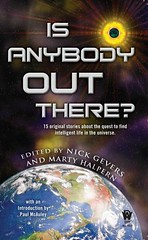Science fiction has always had a love affair with aliens, as far back as the early days of the pulps, with their BEM1 covers and stories such as John W. Campbell's "Who Goes There?"2 (written as by Don A. Stuart in Astounding Science Fiction, August 1938 -- pictured left) and Murray Leinster's "First Contact" (in Astounding Science Fiction, May 1945 -- pictured below).
I don't recall my age at the time, but I had the misfortune to be home alone on a Saturday afternoon when the movie Invaders from Mars was the featured matinee movie on television. And to tell you the truth, I've not watched the movie again since! I'm going strictly by memory here, so bear with me if all the details in this brief recap aren't completely accurate (though I did look up the characters names on the Internet Movie Database).
As I recall, ten-year-old David MacLean wakes up one morning to a loud noise and bright lights outside. He rushes to his bedroom window in time to see a flying saucer land in the sand dunes just beyond the fence. He tells his father, who goes outside to investigate, but his father doesn't return home until the following day -- and when he does, he behaves differently: moody, sullen, quick to anger. And, David spots an unusual, albeit small, scar on the back of his father's neck. Soon, the same personality change (and scar) affects his mother, the police chief, and other townspeople. David finally turns to, and confides in, a local doctor, Pat Blake, and she, in turn, confides in a local astronomer, Stuart Kelston. Together, they convince the Army of the danger, and the Army intercedes. The good doctor is captured by the aliens, but she is rescued just before the mind-controlling device is inserted in the back of her neck. At the climax of the film, the Army endeavors to blow up the UFO bunker, as the UFO itself attempts to lift-off. David, Doctor Pat, and others are racing down the hill, away from the UFO and the pending explosion -- while the recent events pass before David's mind's eye -- and then...
David awakes as from a dream, to a loud noise and bright lights outside. He rushes to his bedroom window in time to see a flying saucer land in the sand dunes just beyond the fence.
Whew! That was a creepy ending. Dream becomes reality? -- not something I had ever seen in a movie, at least at that point in my young life. I can't say I had actual nightmares of that movie, but certain images were burned in my mind for many years, particularly the evil-looking alien head with the wriggling tentacles, encased in a large glass bubble, carried by two Martians: green, seven-foot-tall, primitive-looking creatures with insect-like eyes. As I said, I haven't seen Invaders from Mars probably since I was around David's age, but the images, and feelings, still remain. (I will also admit that I haven't seen the movie Alien, either, since its original theater run -- and a midnight showing at that; but I'll never shake the image of the alien bursting out of Kane's [John Hurt] chest.)
For me personally, it's a love/hate relationship with alien tales: they can freak the bejesus out of me -- particularly movies -- but I keep coming back for more. Something about the unknown, and the unknown possibilities -- and the hope that, just maybe, there really is an ET out there somewhere.
 This is why, in 2007, after Nick Gevers and I decided to work together on an original anthology project, I jumped at the prospect of doing Fermi Paradox-themed Is Anybody Out There?
This is why, in 2007, after Nick Gevers and I decided to work together on an original anthology project, I jumped at the prospect of doing Fermi Paradox-themed Is Anybody Out There?And this is also why, on August 27, 2008, when I visited the house of Night Shade in San Francisco, and met with Jeremy Lassen, Editor-in-Chief, to discuss ongoing and future projects, I proposed an anthology of previously published "alien contact" stories. In the course of contacting authors for Is Anybody Out There? a few had expressed to me the fact that they had already written their Fermi Paradox story, or their first contact story, and thus weren't particularly interested in writing yet another such story. This got me to thinking: Classic Golden Age stories like Leinster's "First Contact" and Campbell's "Who Goes There?" have been collected in numerous anthologies [I strongly recommend The Science Fiction Hall of Fame anthology series], but not so these "contemporary classics" from, say, the past 30 years or so. Periodicals are ephemeral, and online 'zines even more so (if SCI FICTION4 is any example). So, it falls on editors and anthologists to ensure these stories are collected for present as well as future readers.
Author James Gunn, professor emeritus of English, and director of the Center for the Study of Science Fiction, both at the University of Kansas, postulates that "humanity/the individual and the alien" is one of the 14 Basic SF Plot Elements.5 Right up there with time travel, AIs, dystopian SF, space travel, etc. -- though Gunn has a far more elegant way of stating these in his list.



